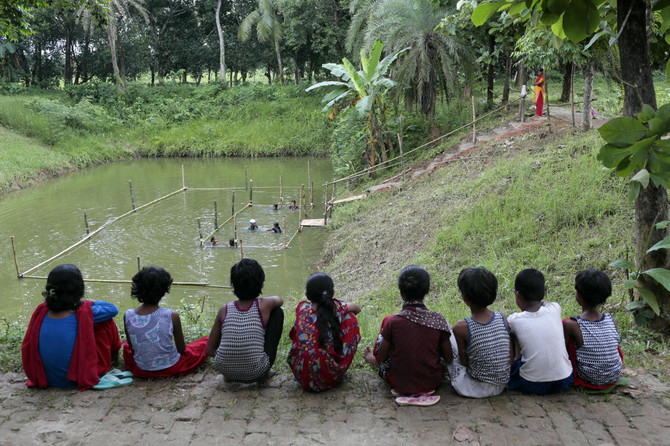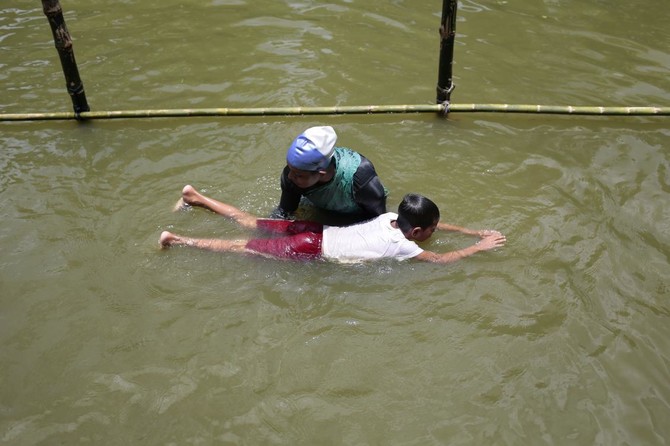BANGLADESH: The 11-year-old girl, once frightened to go near the water, is practicing how to float in a makeshift swimming pool made of bamboo. As she maneuvers through the water, children surrounding the pool cheer.
This is more than a fun summer splash. She is learning to swim to avoid becoming one of the 50 children who die each day in the hundreds of canals, rivers and streams crisscrossing the delta nation of Bangladesh.
“I was afraid of water, I never thought of jumping into water,” the girl said. But with swimming skills, “if we fall into any danger ... we could save our lives.”
Drowning is a major cause of death among youngsters in Bangladesh, claiming up to 18,000 children under the age of 18 every year — and 43 percent of deaths among children under 5, according to a 2011 government survey. One housewife said she is overwhelmed by regret for not ensuring her children could swim, after losing both of her sons and a nephew to a river near their grandfather’s village not far from the capital of Dhaka in May.
“All the mothers, my sisters, please, remain alert,” Samela Begum said, weeping. “Please teach your sons to swim, otherwise your laps will become empty like mine.”
In an effort to help mothers like Begum, a British charity has partnered with a Bangladeshi research group to offer swimming lessons in this central Bangladeshi farming village for children from poor, rural families.
“We consider swimming as vaccine for preventing children’s deaths,” said Aminur Rahman, a lead researcher with the Dhaka-based Center for Injury Prevention and Research , which also offers swimming lessons in other Bangladeshi villages and in the capital. Similar programs have also been started by other groups in the Philippines and Vietnam.
The British charity — based in Kent and named The Sreepur Village, Bangladesh , after its flagship location — recently added the swimming lessons to its overall program aimed at offering commercial skills to some of the 142 single mothers and their 280 children recruited from across the South Asian nation. The idea for them to share the skills with others once they go back to their communities, especially those in the poorest districts where most child drownings occur midday when parents are away at work.
The mothers and their children live at Sreepur Village for up to three years. The village was established in the 1980s by a British charity worker to help impoverished Bangladeshi women and has modest concrete homes, playgrounds, a clinic and more than 18 acres (8 hectares) of farmland.
“This is not about teaching children to be excellent competitive swimmers,” said Matthew Silvester, a child development specialist from London who works in the village. “This is purely a drowning prevention scheme to make sure that our children are protected and have the skills required.”
The program begins with smaller children spending a half-hour splashing around in a 3-foot-deep swimming tank strewn with brightly colored toys. Nearby, in a natural pond, two instructors teach about six older children the basic strokes and survival techniques. A dozen other children wait nearby for their 30-minute turn, some of them jogging, stretching or doing light calisthenics before diving in.
“It’s all about confidence,” said Mukta Tarafder, one of the instructors. “Those who used to be afraid of water are no longer afraid.”
Swim class aims to stop major cause of death in Bangladesh
Swim class aims to stop major cause of death in Bangladesh

Where We Are Going Today: ‘Avindar Lounge’ in Riyadh

- The lights are dimmed every Tuesday night for a candlelit experience with a pianist playing live music, creating an atmospheric experience for guests
With four locations across the Kingdom’s capital, Avindar Lounge offers a space where you can enjoy lush greenery and good food.
The lounge I visited is located on the northeast side of Riyadh and includes a separate section for smokers.
The menu is diverse and appeals to different tastes, so you can sample anything from Middle Eastern kebabs to pasta and burgers.
The lights are dimmed every Tuesday night for a candlelit experience with a pianist playing live music, creating an atmospheric experience for guests.
I tried the mixed appetizer, which was flavorful and memorable. It included hummus, tabouli, dolma, and baba ghanoush.
And while I am generally not a fan of sweet beverages, I genuinely enjoyed their hot chocolate, which was not overwhelmingly sweet or creamy.
However, considering the portion sizes, which are enough for one person, customers might find the prices a bit high.
But the music and bird sounds, paired with the lounge’s colorful and cozy interior, make Avindar a refreshing spot for dining or coffee with friends.
Where We Are Going Today: ‘Dakkat Haretna’ restaurant in Riyadh

Located in the bustling Al-Munsiyah neighborhood of Riyadh, Dakkat Haretna is a charming eatery that captures the essence of Saudi Arabia cuisine.
The interior is adorned with Qatt Asiri art, traditional Saudi motifs that resonate with the spirit of the region. The windows, designed in the Hijazi roshan style, add to the charming appeal of the space which is cozy and family friendly.
Behind the menu is chef Douha Al-Otaishan, whose vision brings to life dishes that celebrate the rich culinary heritage of Saudi Arabia.
I sampled the beetroot salad, which had refreshing ingredients, complemented by feta cheese balls and crisp lettuce, that set the stage for the main course.
The marqooq beef and “happiness kabsa,” Al-Otaishan’s signature dish, were both memorable. I polished off the flavorful marqooq in no time.
The kabsa, with its tender chicken, was delightful despite the rice being a tad drier than what I usually enjoy. The accompanying tangy red sauce elevated the dish by adding a burst of flavor.
Other notable options for those wishing to explore Saudi cuisine are jareesh, qursan, and kubaiba Hail.
Their breakfast menu is equally enticing, providing classics including tamees, foul, and shakshooka, available from 7 a.m.
If you enjoy cooking and want to recreate Saudi dishes at home, the restaurant also offers the chef’s blends of spices.
With attentive service, fair prices, and a calm ambiance free of noisy music, Dakkat Haretna is a comfortable place to enjoy traditional dishes or try something new.
Whether you are familiar with Saudi cuisine or just curious, it is a spot worth visiting.
Where We Are Going Today: ‘Olala Roastery’ – coffee roasters in Saudi Arabia

- The packaging is part of the Olala experience — lively illustrations, custom stickers and even branded takeaway cups. Every element reflects fun and youthful energy, making it perfect for gifting or for coffee lovers with an eye for design
Olala Roastery is one of the most recognizable names among local coffee roasters in Saudi Arabia.
I tried two of their signature boxes: Nsahsah (Wake Me Up) and Mw Eadi (Not Your Usual), each with labeled blends and a colorful unboxing experience.
The Not Your Usual box featured two exceptional beans — vista and roza. Vista quickly became a favorite, thanks to its smooth body, light acidity, and a finish that felt both clean and vibrant. It was the kind of coffee that stood out from the first cup. I finished it so quickly — it was the best I have ever tried.
Roza, with its subtle fruity tones, offered a more delicate profile that worked beautifully for slower mornings.
The packaging is part of the Olala experience — lively illustrations, custom stickers and even branded takeaway cups. Every element reflects fun and youthful energy, making it perfect for gifting or for coffee lovers with an eye for design.
One drawback, however, was the inconsistency between the flavor notes written on some of the packaging and the actual taste of the coffee. The flavor profiles were not as clear or defined as described, which may leave some drinkers guessing — especially those who choose beans based on specific expectations.
Still, Olala Roastery delivers fresh, well-roasted coffee wrapped in a full sensory experience, making it a creative and proudly Saudi addition to the specialty coffee scene.
For more information, check @olala.roastery on Instagram.
Where We Are Going Today: Ashwag restaurant in Jeddah

- Ashwag’s cozy atmosphere offers comfort and privacy, making it a perfect spot for families
If you are craving comforting Turkish flavors in a cozy, family-friendly setting, Ashwag restaurant in Jeddah is the place to go.
Since 1975, Ashwag has been a favorite for families seeking authentic Turkish food in Jeddah and Makkah. For many of us who grew up in Jeddah, it holds a special place in our hearts.
The menu features traditional dishes including mixed grills, juicy shish tawook, shawarma platters, meat with eggplant, and more.
My top pick is the Iskender meat: tender shawarma-style cuts over soft Turkish bread soaked in ghee, topped with tomato sauce, and served with fresh, creamy yogurt. It is a dish that brings back weekend family memories.
Ashwag’s cozy atmosphere offers comfort and privacy, making it a perfect spot for families. The decor blends vintage charm with a classic feel, creating a warm and welcoming vibe.
For dessert, try their baklava, sutlac (rice pudding), kunafa, caramel pudding, and basbousa. All pair wonderfully with Turkish tea to finish your meal.
With Turkish pies, rich tajines, and plenty of vegetarian options, Ashwag offers a great balance of tradition and variety. There is something for everyone.
For more details, check Instagram @ashwag_restaurant.
Where We Are Going Today: ‘Ovun Bakehouse’ in Riyadh

- Among the standout dishes was the homemade soujouk, which had just the right level of spice
Ovun Bakehouse in Riyadh blends Lebanese flavors with modern techniques — all without losing touch with its roots.
The space itself is warm and intimate, and everything from the menu to the ambiance is carefully curated, down to the fresh bread that is baked in house.
We started with the Ovun salad and stuffed tomato for SR38 ($10), both were vibrant and well balanced. The mama ganouj was a surprising twist — instead of traditional eggplant, it’s made with grilled cauliflower, giving the dish a lighter, earthier flavor, while keeping the smoky essence that makes it a classic.
Among the standout dishes was the homemade soujouk, which had just the right level of spice. The pesto tawook for SR72 was tender, juicy, and paired with the softest flatbread.
We also tried the zaatar and cheese manakeesh, which was baked to perfection — crisp on the outside, soft inside, and bursting with flavor.
For drinks, the mango cooler was refreshing, not too sweet, and paired well with the richness of the food.
Saudi national guard minister
While some dishes are a little pricey, what makes Ovun worth visiting is not just the food, but how every dish feels like a personal invitation into Lebanese culinary tradition.
For more information, check their Instagram @myovun.sa.

















